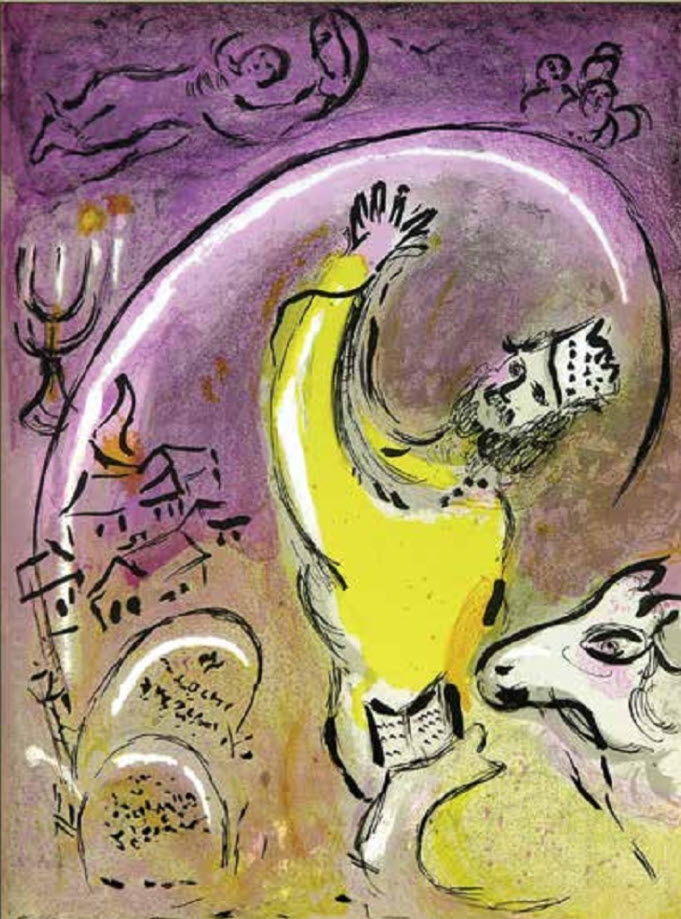Reflections on Kohelet
By Bruce Heitler
The Sun Also Rises
A time to be born and a time to die
Nothing new under the sun
Vanity of vanities
The wise have their eyes in their heads
(Compare to, “the eyes in his head see the world spinning ’round”).
Ecclesiastes is a redoubtable inventory of titles for books and songs. And the text is dense with wisdom. From Chapter 7:
A good name is better than fine perfume,
and the day of death better than the day of birth.
It is better to go to a house of mourning
than to go to a party,
for death is the destiny of everyone;
the living should take this to heart.
Sorrow is better than laughter,
since a sad face may improve the heart.
The heart of the wise is in the house of mourning, but the heart of fools is in the house of pleasure.
And with a wink toward the contemporary American scene:
One who craves money will not be satisfied with money.
My encounter with this text began when, as a young man, I was confronted by the importance of learning to reframe my experience. Three close friends, two in separate car accidents and one by suicide, died within a few months. I had been with each of them shortly before their death. Seated beside my close friend on a rainy evening in France, I was also seriously injured in the head-on collision with a truck that took his life. His Guarnerius violin survived undamaged in the back seat of our red VW Beetle. With several hours of prograde and several weeks of retrograde and several weeks of anterograde amnesia, I struggled to discover the facts and discern the truth. The inquest did not determine who had been driving or that anyone was legally liable for the collision. Emerging from amnesia was a kind of re-birth into a world of moral reckoning. After months of confusion and recuperation, I confronted a momentous choice: Incapacitating grief or purposeful re-dedication; rejection of meaning or pursuit of deeper meaning; drifting, unmoored without a compass or searching for direction; repression or heightened moral awareness. The events were mine to interpret, and interpretation makes all the difference. Instinctively, I was looking for a guidebook on interpretation.

King Solomon by Marc Chagall
Ecclesiastes, or the Hebrew name I prefer, “Kohelet,” used to delight me. I found when I mentioned this reaction to others, it often elicited a skeptical response: No, that is a book of depression, the mournful elegy of Solomon’s old age, futility and even despair. Why should the same text elicit such optimism and liberation to some, including me, and pessimism and darkness to others? Jewish communities read the text each year at Sukkot, the Autumn harvest festival. Is it the joy of the harvest or the dire onset of Winter that we bring to mind? Of course it is both. Moreover, bleak winter is a crucial moment in the cycle of fertility.
The text opens by stating that its author is “Kohelet, son of David, King in Jerusalem,” which among all of David’s sons, must be Solomon, the embodiment of wisdom. The next line proclaims “Hevel, Hevel, it’s all Hevel!” One translation says, “Vanity”; another “Futility,”’ and the dictionary says “Vapor, like a breath on a cold morning.” Hevel is a vanishing mist, evanescent, inscrutable and insubstantial. The brother of Biblical Cain, who is vanquished with a single blow, is also named Hevel. Abel, as he is known in English, is innocent, insubstantial and impermanent.
Kohelet is a workbook for improving our skills for dealing with the ethics and psychology of uncertainty. In the intellectual moment of the 20th century, Kohelet appears as an ancient text on how to think about quantum mechanics. As Niels Bohr pointed out in his famous essay on the Principle of Complementarity, light is both a particle and a wave. Yet at any one time, we can only perceive it as one or the other. We cannot grasp the essential nature of light, because our experiments affect what we see. Heisenberg’s uncertainty principle is Solomon’s Hevel. In the 21st century, we find the same skills vitally important in coping with the collapse of macro-economic theory, distortions in democratic governance, emergent properties, fractal patterns, chaos theory, and clumsy continuity rather than the end of history.
After setting up the premise that it is a fool’s task to pursue certainty, the text jumps into pirouettes of verbal agility. Take one example from many. Verse 10:9 could be translated, “The one who takes the stone will carve it, and the one who fells trees will be sheltered by them.” In other words, “Take action boldly, it will benefit you”. Or the translation could be “The one who moves the stone will suffer by it, and the one who fells trees will be endangered by them.” In other words, “Beware of taking action, disruption may harm us and upset the apple cart.” Utilizing the inherent ambiguity which results from the compact vocabulary of the Hebrew language, the same phrase says both “Take the risk” and “Don’t take the risk.”
We find the same dyads in American folk wisdom: “A stitch in time saves nine” and “Haste makes waste.” “Don’t just sit there, do something,” and “Don’t just do something, sit there!” In fact, the Talmudic wisdom text called the Chapter of the Fathers suggests that such complementary pairs are so essential that they will last forever.
Kohelet hones our ability to maintain balance in a world of uncertainty. Unlike the moral disorientation portrayed by Brecht and Weill in their opera Mahagonny, “Gibt es nicht woran man sich halten kan”—There’s nothing to hold on to), Kohelet offers brilliant exercises for delighting in ambiguity, being nourished by vapor, growing stronger in a constantly unfolding world, cultivating humility, flexibility, and good humor. We strengthen our spirit by encountering the vapor and learning to dance with it.
Conversations with one of my favorite teachers were frequently refreshed when he would observe, “Oh, I never thought of it that way!” May we all delight in being able to see things in a way that never occurred to us before, and relish Solomon’s observation: “Vapor and evanescence, it’s all vapor!”
Bruce Heitler’s translation of the Book of Ecclesiastes was published by Hevel Press, Denver, where he resides.

